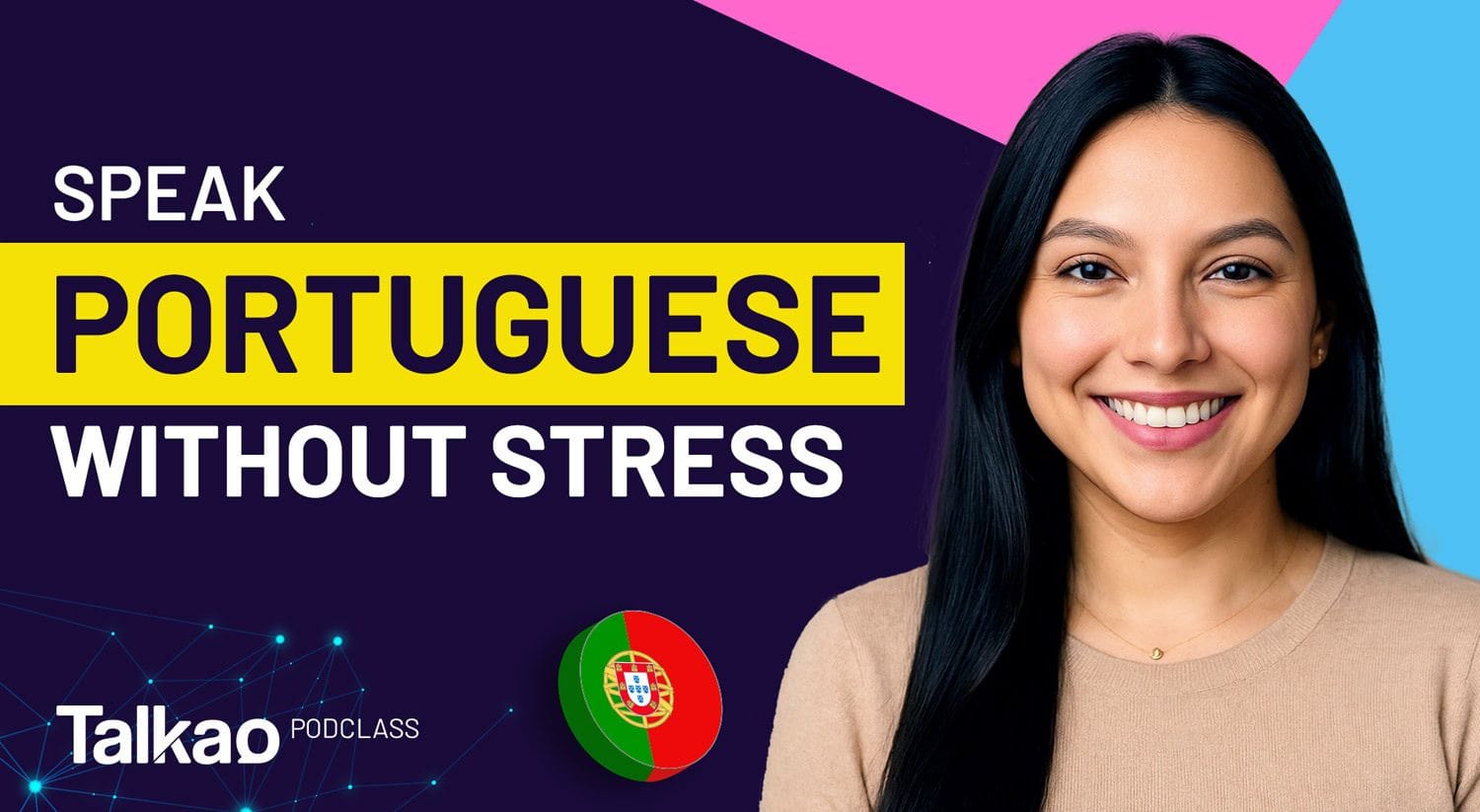
Without a doubt, learning Portuguese is a real challenge. Its complex grammar and distinctive pronunciation can be demanding. Yet, Portuguese remains one of the most fascinating languages in the world, with a unique rhythm and vocal cadence that captivate learners from all backgrounds.
By learning Portuguese, you gain access not only to one of the richest cultures in Europe—Portugal—but also to Brazil, the land of samba, bossa nova, and a vibrant cultural scene. Beyond these countries, Portuguese is also spoken in various African countries and several nations. There it serves as an official language and primary means of communication.
In today’s Episode 4 of the Talkao Podcast, we dive into why learning Portuguese is so important. We’ll also explore the value of international Portuguese language certifications, and how they can enhance both your career and cultural connections.
Of course, we won’t overlook the global influence of Portuguese in business, culture, and the arts. We’ll also discuss how AI-powered predictive translation and advanced neural translation technology are making it easier than ever to learn and master the language.
Get ready to discover Portuguese from a practical and dynamic perspective—only on the Talkao Podcast.
Why learn Portuguese?
When thinking about learning a new language, it’s natural to consider options like English, French, or German. However, Portuguese is increasingly capturing global attention—and for good reason. It’s one of the fastest-growing Romance languages in the world, second only to Spanish. So, if you’re looking to expand your language skills, learning Portuguese can open many doors—both professionally and culturally—that you may not have imagined.
In Episode 4 of the Talkao Podcast, you’ll discover why learning Portuguese is a smart and forward-thinking decision. We’ll explore how the language influences different areas such as culture, the arts, and international business, and the unique opportunities that come with mastering a language spoken by over 265 million people worldwide.
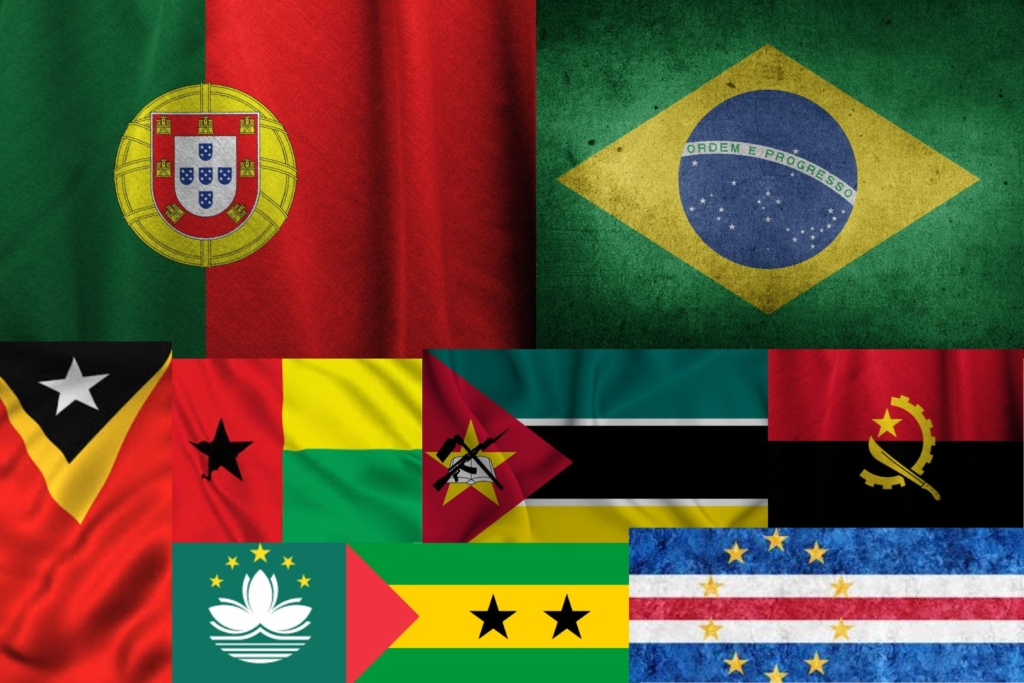
A global language: Portuguese around the world
Portuguese is the official language in nine countries across four continents. Besides Portugal and Brazil, it’s also spoken in Angola, Mozambique, Guinea-Bissau, Cape Verde, São Tomé and Príncipe, East Timor, and Macao. This global presence makes Portuguese a strategic language for international relations, global trade, and diplomacy.
If you work in an international field or are looking to expand your career prospects, speaking Portuguese positions you competitively. In your Portuguese classes, you’ll learn that the language varies in accent, pronunciation, and vocabulary depending on the country. For example, Brazilian Portuguese differs significantly from European Portuguese, and likewise, Portuguese spoken in Angola or Cape Verde differs from that in Macao or São Tomé.
But don’t worry—AI-powered predictive translation tools make understanding these differences much easier. Let’s now take a closer look at how Portuguese is applied in the modern world.
Connect with Brazil: A cultural and economic powerhouse
One of the most compelling reasons to learn Portuguese—besides closer ties to Portugal—is Brazil. Why? Because Brazil is home to the largest population of native Portuguese speakers, with over 210 million people. This South American giant stands out not only for its cultural diversity but also for its growing influence as an emerging global economy.
By learning Portuguese, you’ll be able to:
- Better understand the Brazilian market
- Engage with multinational companies based in Brazil
- Participate in cultural and academic exchanges
- Fully enjoy Brazilian cinema, music, and literature
From bossa nova to the works of Jorge Amado, Brazilian culture is rich and expansive. These experiences take on new meaning when you understand the language at its core.
Although Brazil is strategically important, Portuguese extends far beyond the borders of one country. Thanks to advanced neural translation technology, learners today can explore the language’s deep historical and cultural roots across continents.
Let’s dive into how Portuguese connects you to an ancestral and modern global culture.
Learning Portuguese: A gateway to a language rich in cultural heritage
Linguistically, Portuguese originates from Vulgar Latin, making it a Romance language like Spanish, French, or Italian. This shared root makes Portuguese easier to learn—especially if you already speak one of these languages. As you’ll see later, if you’re a Spanish speaker, learning Portuguese will be significantly easier. But if you don’t speak any of these, don’t worry—AI-powered predictive translation will be your best ally.
Let’s go back to the core: Portuguese as the cultural standard of Portugal and its former colonies around the world. The Portuguese language is deeply influenced by Arabic, Hispanic, and Roman elements. In its non-European varieties, Portuguese also absorbed elements from African languages and South American Indigenous languages.
This linguistic fusion gives Portuguese a unique richness in vocabulary and sound. So, when you learn Portuguese, you’re not just acquiring a communication tool—you’re unlocking access to a diverse and captivating cultural heritage.
Art, literature, and music: A language that sings
If you’re passionate about culture, learning Portuguese opens the door to extraordinary artistic worlds. In Portugal and Brazil—without forgetting African Portuguese-speaking countries—the language stands out in:
- Literature: You’ll be able to read authors like Fernando Pessoa, José Saramago, or Clarice Lispector in their original language. This allows you to capture nuances that often get lost in translation.
- Music: From Portuguese fado and Brazilian samba to tropicália and emerging urban genres, the music scene is vibrant. You’ll better understand legendary artists such as João Gilberto, Chico Buarque, Cesária Évora, and Amália Rodrigues.
- Cinema and TV: Lusophone productions are gaining space on global streaming platforms. Knowing Portuguese helps you follow stories with authenticity and cultural depth. While you can use advanced neural translation and multilingual conversational AI, speaking the language naturally improves your comprehension.
Portuguese is often praised for its melodic and captivating sound, which adds an aesthetic layer to your learning process. Speaking Portuguese is also about feeling and expressing through language.
And beyond the cultural dimension, learning Portuguese offers practical and professional benefits that we’ll explore in the next section.
Advantages of learning Portuguese in business and academia
Portuguese is gaining increasing relevance in the business world. Today, companies are actively looking for professionals who can operate in Lusophone countries or establish strategic partnerships with Portuguese-speaking stakeholders.
If you choose to learn Portuguese, you’ll be able to:
- Apply for key roles in international business
- Join academic exchange programs with top universities in Brazil or Portugal
- Take part in international cooperation projects or sustainable development initiatives in Portuguese-speaking Africa
In today’s globalized world, many companies in the tech, tourism, and education sectors are seeking international collaborators—people with strong language skills who can foster multicultural communication.
A clear advantage for Spanish speakers
If you’re a native Spanish speaker, you have a major advantage when learning Portuguese. The two languages share very similar grammar structures and a large number of cognates—words that are spelled and mean the same thing in both languages.
This linguistic proximity allows for a faster learning curve, especially when it comes to reading and understanding written content. However, it’s important to watch out for false friends and pronunciation differences—two of the main challenges for Spanish speakers.
Still, with proper instruction and consistent practice, you’ll be able to achieve a functional communicative level in just a few months.
And this brings us to one of the biggest challenges for learners: mastering Portuguese pronunciation. But don’t worry—in Episode 4 of the Talkao Podcast, you’ll learn that it’s not as hard as it seems. With guidance from one of today’s leading Portuguese experts, you’ll discover how to approach pronunciation with confidence and ease.

Overcoming pronunciation and writing challenges when learning Portuguese
When you decide to learn Portuguese, you embrace a fascinating language with rich cultural depth and a captivating sound. However, like any foreign language, it brings its own set of challenges—especially in two critical areas: pronunciation and writing.
Overcoming these obstacles isn’t just possible—it’s essential for improving your fluency and full comprehension. In the Talkao Podcasts, you’ll discover the main pronunciation hurdles and learn how to master Portuguese orthography effectively. Plus, you’ll see how neural machine translation and AI-powered predictive translation can be game-changers in your learning journey.
Pronunciation in Portuguese: Nasal sounds and unique vowels
Brazilian Portuguese has a distinctive phonology that Spanish speakers may find surprising due to its abundance of nasal vowels, diphthongs, and open/closed vowel contrasts. Here are some common pronunciation hurdles:
- Nasal vowels: Words like pão (bread) and mãe (mother) contain nasal sounds absent in Spanish. Initially, they may feel like you’re exaggerating a cold.
- No industry z vs s: Portuguese doesn’t distinguish between “casa” and “caza”—they sound the same.
- Sounds like “ão” or “lh”: In words like coração (heart), the nasal diphthong “ão” is tricky. And “lh” (similar to the soft Spanish “ch”) takes practice.
- Intonation and rhythm: Portuguese has a more melodic rhythm than Spanish, so accents and emphasis patterns may initially sound unfamiliar.
How to overcome these challenges?
- Listen to native material daily: Podcasts (including Talkao), songs, movies, and videos are your best allies.
- Mimic sounds regularly: Don’t be shy; repeat words out loud until they feel natural.
- Record yourself speaking: It’s the best way to identify and correct mistakes.
- Practice with native speakers: Direct feedback is essential for oral improvement.
- Use AI tools: Predictive AI and neural translation let you listen to your own speech, compare it with correct pronunciation, and adjust in real time.
Writing in Portuguese: Spelling with plenty of details
Although Portuguese uses the Latin alphabet like Spanish, its orthography is full of unique rules and exceptions:
- Use of diacritics: Acute accents, circumflexes, and nasal diacritics guide pronunciation. Skipping them can change meanings entirely.
- Close, but not identical spelling: Words like educação (education) and intenção (intention) look and sound familiar, but their emphasis and spelling differ.
- Cedilla (ç): Found in words like coração (heart) or açúcar (sugar), it alters pronunciation dramatically.
- Irregular verbs and conjugations: Portuguese features many irregular forms, especially in compound tenses.
Effective writing strategies
- Complete dictation exercises: They sharpen both listening and spelling skills.
- Read daily: Exposure to texts helps internalize grammar rules and accent usage.
- Study spelling rules and exceptions: Especially around verbs and accents.
- Use digital spell-checks and dictionaries: AI-powered tools like Talkao’s text features resolve spelling doubts instantly.
European vs. Brazilian Portuguese: Variants that matter
Choosing which variant of Portuguese to learn—European or Brazilian—is important from the start. Though mutually intelligible, they differ in:
- Pronunciation
- Gerund usage
- Vocabulary
- Formal grammar conventions
For example, autocarro (bus) in Portugal vs. ônibus in Brazil. Defining your target variant helps avoid confusion and builds a solid foundation. Thanks to neural translation and Talkao’s features, your learning can adapt seamlessly to either variant. Once you master one, the other becomes significantly easier.
Getting ready for the CAPLE exam
The CAPLE (Centro de Avaliação de Português Língua Estrangeira) is the official Portuguese proficiency test, managed by the University of Lisbon. Recognized globally, it’s essential for:
- Portuguese citizenship applications
- University admissions in Portugal
- Employment in Portuguese-speaking contexts
- Mobility in Lusophone countries
Key exam tips
- Expand thematic vocabulary: Daily life, education, job markets, tech, culture, politics.
- Master functional grammar: Aim for correct expression in writing and speech.
- Train listening comprehension: Use European Portuguese videos, news, podcasts, and interviews—mandatory for the exam. Real-time and predictive translation tools from Talkao are incredibly helpful.
- Practice writing: Draft formal emails, summaries, essays; focus on organization, clarity, cohesion.
- Simulate oral exams: Practice dialogues, presentations with peers or teachers. Clear pronunciation, proper intonation, and confidence are crucial.
Talkao classes: The perfect blend of traditional and digital learning
Formal classes remain foundational, but today’s digital world offers powerful online alternatives. With Talkao Portuguese courses, you can learn conveniently at home without high costs. These online sessions complement traditional classroom work—they’re not competitors.
AI-driven predictive translation and neural translation tools are available whenever you need them. They make the learning process more:
- Effective
- Practical
- Dynamic
Accessible, flexible, and easy to personalize—so go ahead… learn Portuguese and don’t look back. You won’t regret it!
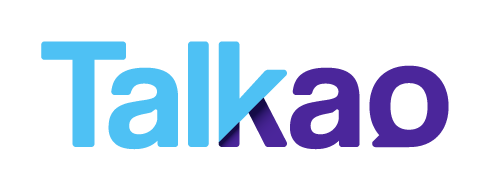




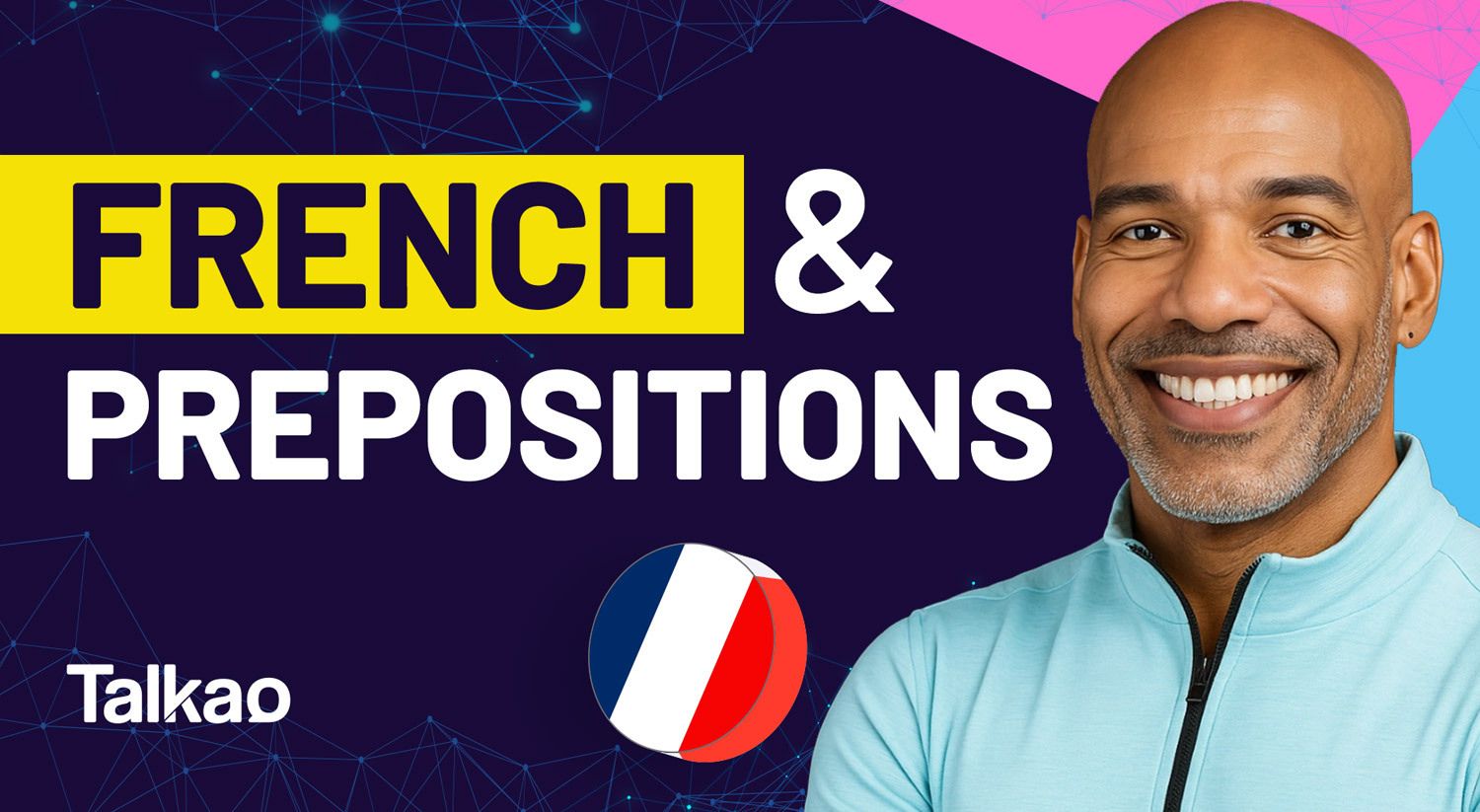

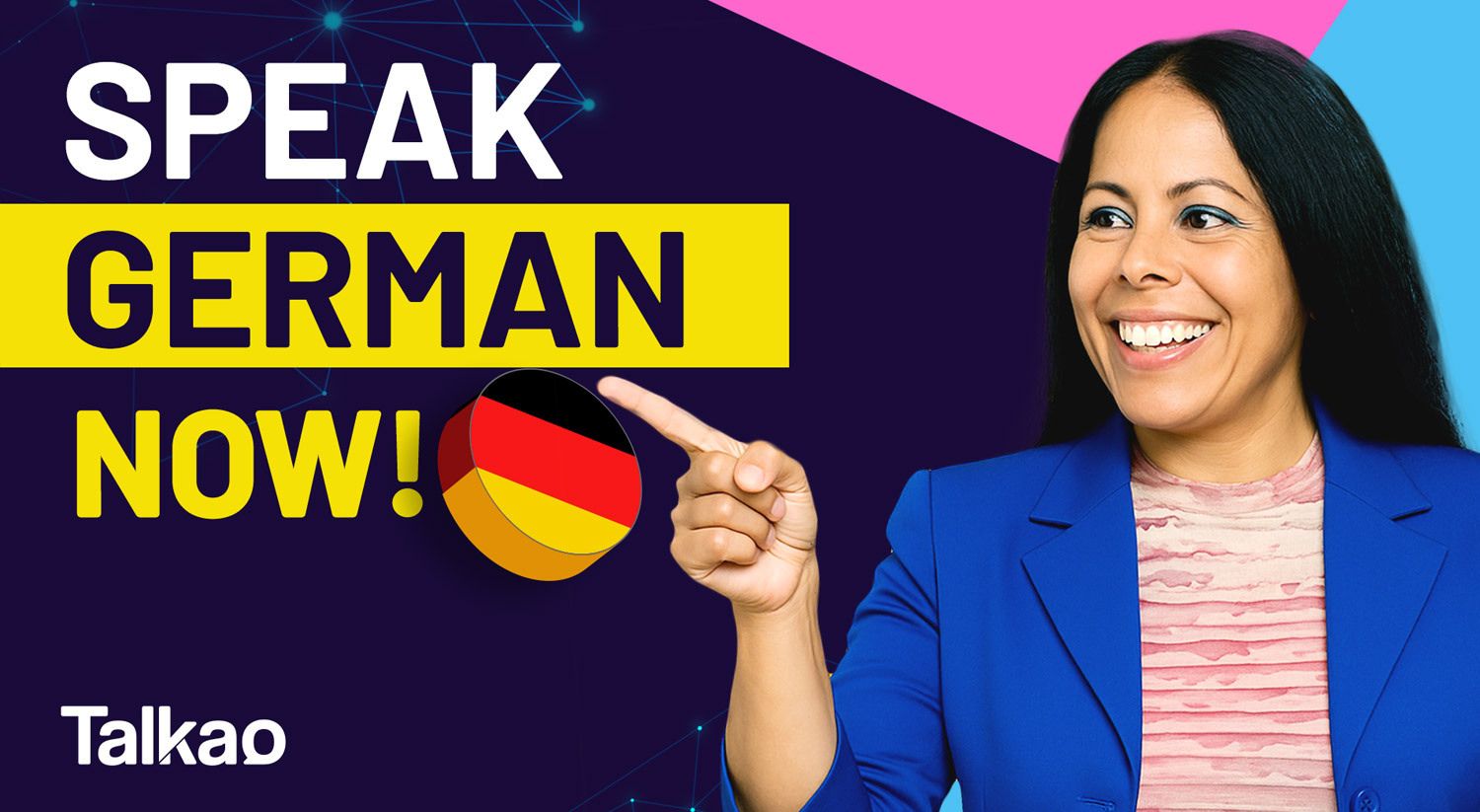
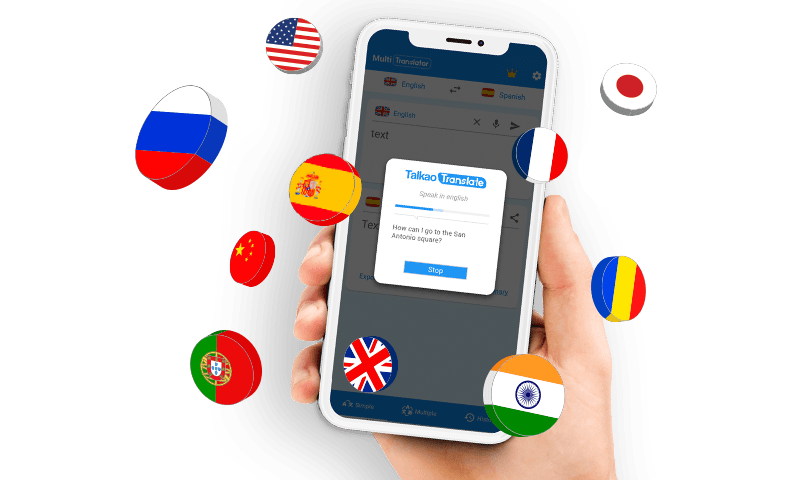

Newsletter